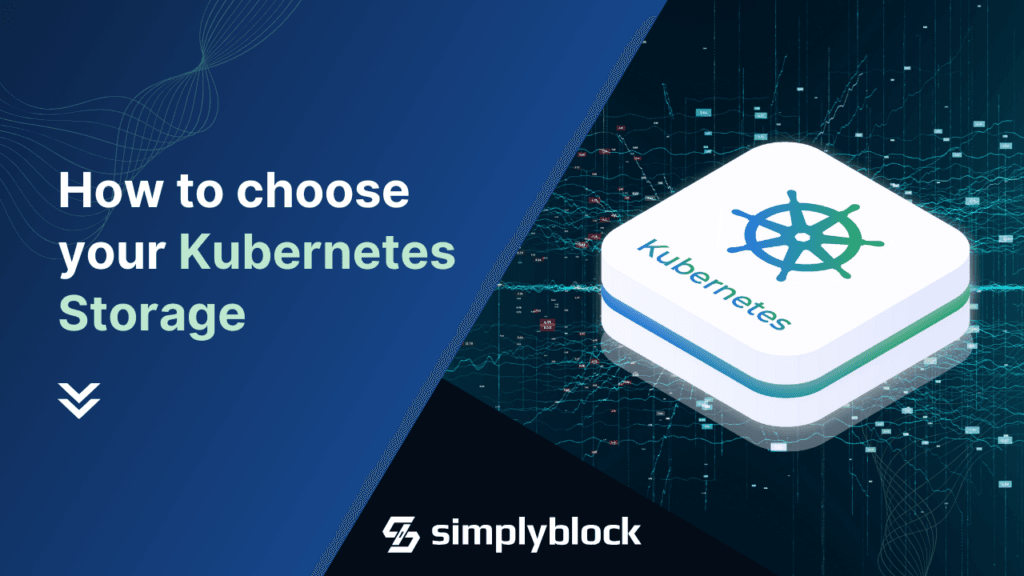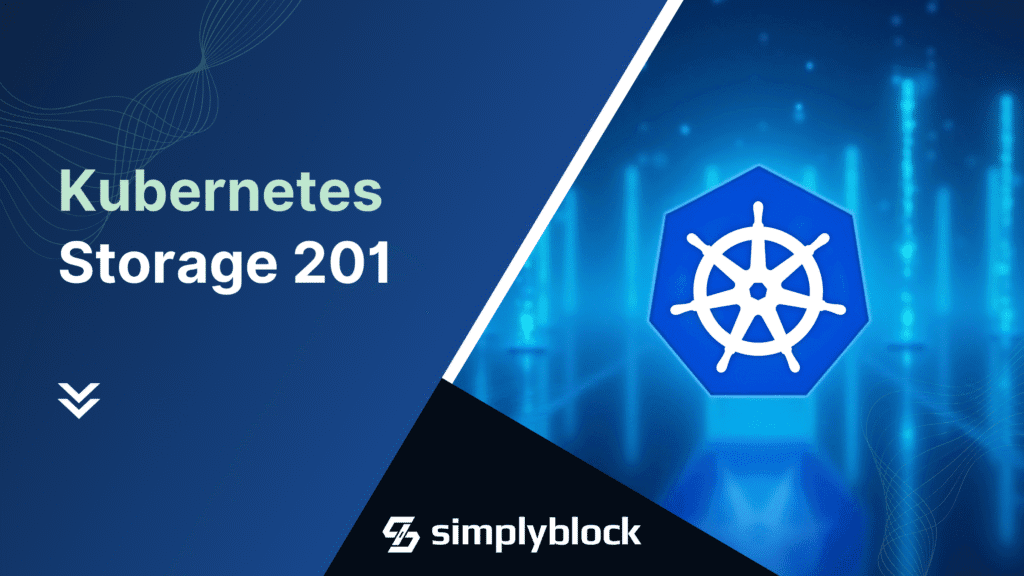
Blockbridge is a software-defined storage (SDS) solution that offers high-performance, all-flash NVMe block storage for enterprise applications and cloud providers.
It provides features like fine-grained multi-tenancy, elastic block storage, and support for various environments, including Kubernetes, VMware, and Proxmox. However, the storage landscape is vast, and several Blockbridge competitors offer alternative solutions with varying features and capabilities.
Simplyblock – The Leading Blockbridge Competitor
Simplyblock is a high-performance, software-defined storage platform designed for modern workloads. It leverages NVMe over Fabrics (NVMe-oF) and SPDK to deliver ultra-low latency and high IOPS, making it ideal for Kubernetes environments, databases, and analytics workloads.
Benefits of Simplyblock
Simplyblock offers a modular, adaptive, unified, shared-everything (MAUS) architecture, providing flexibility and scalability. It supports both ARM64 and x64 architectures, ensuring broad compatibility. With advanced erasure coding, it ensures data protection and storage efficiency. Additionally, simplyblock’s application-transparent storage tiering optimizes performance across different workloads.
Why choose Simplyblock over Blockbridge?
- Advanced Features: Supports end-to-end NVMe-oF, DPU optimization, and advanced erasure coding.
- Cost Efficiency: Offers a usage-based pricing model, reducing total cost of ownership.
- Deployment Flexibility: Compatible with various environments, including Kubernetes and bare-metal setups.
- Simplified Operations: Provides seamless integration with Kubernetes CSI, simplifying storage management.
Other Blockbridge Competitors
Ceph
Ceph is an open-source, unified storage system that provides object, block, and file storage in a single platform. It’s designed for scalability and high availability, making it suitable for large-scale deployments. Due to its architecture, Ceph allows it to distribute data across multiple nodes, ensuring redundancy and fault tolerance.
Longhorn
Longhorn is a cloud-native, lightweight, and easy-to-use distributed block storage system for Kubernetes. Developed by Rancher Labs, it offers features such as incremental snapshots, backups, and cross-cluster disaster recovery. Longhorn is designed to be simple to deploy and manage within Kubernetes environments.
Portworx
Portworx by Pure Storage is a Kubernetes-native storage platform that provides high availability, data security, and backup solutions. It supports various storage types and offers features such as volume encryption, policy-based automation, and multi-cloud support. Portworx is tailored for enterprises running mission-critical applications on Kubernetes.
OpenZFS
OpenZFS is an open-source storage platform that combines the features of a file system and volume manager. It offers data integrity, compression, snapshots, and replication. OpenZFS is known for its robustness and is widely used in various storage solutions, including TrueNAS.
Blockbridge Competitor Comparison Table
Here’s a side‑by‑side comparison of Blockbridge and other leading tools — use it to evaluate which solution best aligns with your operational needs, budget, and scalability goals.
| Feature | simplyblock | Blockbridge | Ceph | Longhorn | Portworx | OpenZFS |
|---|---|---|---|---|---|---|
| Linear Scale-Out Performance | ✅ | ❌ | ❌ | ❌ | ❌ | ❌ |
| Advanced (Distributed) Erasure Coding | ✅ | ❌ | ❌ | ❌ | ❌ | ❌ |
| High IOPS Density | ✅ | ❌ | ❌ | ❌ | ❌ | ❌ |
| Supports ARM64 and x64 | ✅ | ❌ | ✅ | ✅ | ❌ | ✅ |
| DPU Optimized | ✅ | ❌ | ❌ | ❌ | ❌ | ❌ |
| End-to-End NVMe-oF Support | ✅ | ❌ | ❌ | ❌ | ❌ | ❌ |
| Application-Transparent Storage Tiering | ✅ | ❌ | ❌ | ❌ | ❌ | ❌ |
Choosing the Right Blockbridge Competitor
Selecting the appropriate storage provider is crucial for ensuring performance, scalability, and reliability. While Blockbridge offers a robust solution, alternatives like simplyblock provide advanced features, cost efficiency, and deployment flexibility that cater to modern infrastructure needs. Discover Why Simplyblock is the Ideal Storage Solution for Your Organization
Questions and Answers
The main difference is scope. Blockbridge is a dedicated high-performance block storage solution. Ceph is an open-source, unified storage platform designed for massive scale, offering block, file, and object storage from a single cluster. While Ceph is highly redundant, its unified architecture often means a trade-off in peak block performance and IOPS density when compared to specialized block solutions.
Modern platforms achieve superior speed by adopting a high-efficiency data path. They use End-to-End NVMe-oF to eliminate legacy protocol bottlenecks and utilize DPU optimization to offload storage processing tasks from the main CPU. This combination maximizes IOPS density and minimizes latency, which is crucial for demanding workloads like database performance optimization.
These competitors are built to live and manage storage within Kubernetes. They simplify operations by providing integrated features (snapshots, backups) managed directly via the Container Storage Interface (CSI), making them a seamless choice for persistent storage in environments like Amazon EKS.
Key differentiators focus on efficiency and scalability. Simplyblock offers features like Application-Transparent Storage Tiering, which automatically optimizes data placement between different drive types for cost and performance without application intervention. Combined with linear scale-out performance, this provides flexibility and cost savings, particularly in areas like optimizing Kubernetes costs.
Advanced Erasure Coding is significantly more space-efficient than traditional 3-way replication. While replication creates full redundant copies, erasure coding uses a mathematical distribution of parity data across nodes. This achieves comparable fault tolerance with a much lower capacity overhead (e.g., 1.5x capacity use instead of 3x), leading to better storage efficiency and cost savings.



